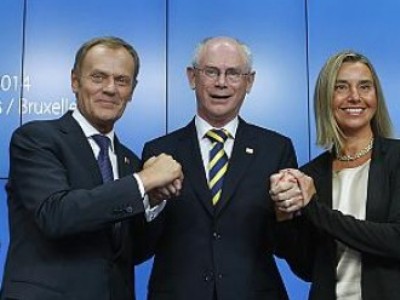Poland and Germany were both initiators and drivers of a New Eastern policy linked to the Eastern neighborhood and Russia/Soviet Union.
Uladzimir Matskevich: The EU will choose moderation towards Belarus

It is no use expecting the change of course in Brussels-Minsk relations in connection with the rearrangement in the EU higher authorities.
A Brussels summit which took place on August 30, assigned Donald Tusk, Poland’s prime minister, who is to replace Herman van Rompuy of Belgium, as president of the European Council, and Federica Mogherini, the Italian foreign minister, who is to replace Catherine Ashton of England, as the European Union's next High Representative for Foreign Affairs and Security Policy/Vice President of the Commission.
Belarusan authorities don’t have any particular affinities with Poland, blaming it in unfriendly attitude and support of the opposition. As well Russia, which pointed out at Poland as at the main ally of Ukraine in Europe. Should we expect that with the appointment of the Poland’s prime minister as president of the European Council the EU policy would change? As over the last time Europe is accused of indecisiveness at the time of the escalation of the Russia-Ukraine conflict. As Uladzimir Matskevich, the head of the Board of the International Consortium “EuroBelarus”, recalls, the authority and the functions of the president of the European Council are “very, very limited”.
“It is a representative role, which means that likewise his predecessor Rompuy, Donald Tusk is to represent the European Council together with other countries or international unions that are not a part of the EU,” noted Uladzimir Matskevich in the interview with the EuroBelarus Information Service. “Let me emphasize that the head of the European Council is only presiding at the sessions of the higher body, where the European policy is elaborated. And it is big players that elaborate it taking into account the rest of the EU countries.”
Uladzimir Matskevich notes that in these two appointments the figure of Federica Mogherini, the Italian foreign minister, seems much more significant.
“A Representative for Foreign Affairs works in close contact with the EU Commission and those EU commissions, which are cooperating with other countries, including Good Neighborhood Committee, which was working with Belarus. Donald Tusk won’t be dealing directly with these relations, he will be voicing the position elaborated by the European Council, no more. Of course, the election of Tusk puts the role of Poland in the EU Council to a new level; however, Poland, as well as Estonia, Latvia, and a number of other Eastern-European countries were unable to block the election of Federica Mogherini to the position of the head of the European diplomacy. So who was chosen? The Italian foreign minister, a socialist, who was accused of close relations with Russia and support of Russian initiatives for the South Stream project, and also blamed of very careful assessment of Russia’s actions in Ukraine. That is why I believe that this figure is more important in forecasting changes in EU-Belarus relations. Besides, even now Italians object to rigid sanctions against Russia. So it is no use cherishing hopes for the rearrangement in the EU authorities. Nevertheless, the European policy will be revised, and the moods in the European Council will be changing, too — both towards Russia, as well as towards Belarus. But if we take Belarus, Realpolitik principle will be implemented; i.e. in the current situation Europeans will prefer moderation towards Belarusan dictatorship and Lukashenko in order to keep Belarus away from supporting Kremlin’s policy in Ukraine. It doesn’t mean, though, that Europeans are taking back all their former statements and resolutions on Belarus; but they certainly won’t proceed quickly.”
Others
-
Uladzimir Matskevich: The sooner the "Union State" is denounced, the better for Belarus
Not only does the “Union State” undermine the establishment of civilized relations with Europe, but it hinders the possibility of normal relations between Belarus and Russia.
-
Uladzimir Matskevich: The regime can no longer control the situation in the country
The authorities are unable to prolong the social contract with the people: there is no way out of the social crisis.
-
Press release of the BNP in connection with the next round of the dialogue in the format of the EU-Belarus Coordination Group
Belarusan National Platform of the Eastern Partnership Civil Society Forum welcomes the dialogue process in the format of the EU-Belarus Coordination Group, the third round of which was held in Minsk on 3-4 April 2017.
-
Hennadiy Maksak: Europe must react adequately to the events in Minsk
A new wave of political repressions should make the EU return to tougher policy towards the Belarusan regime.








Comments
From farewell to a new Eastern policy and towards a new development
Poland and Germany were both initiators and drivers of a New Eastern policy linked to the Eastern neighborhood and Russia/Soviet Union.